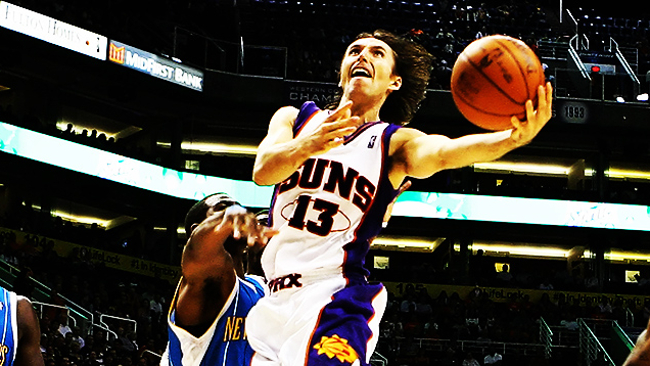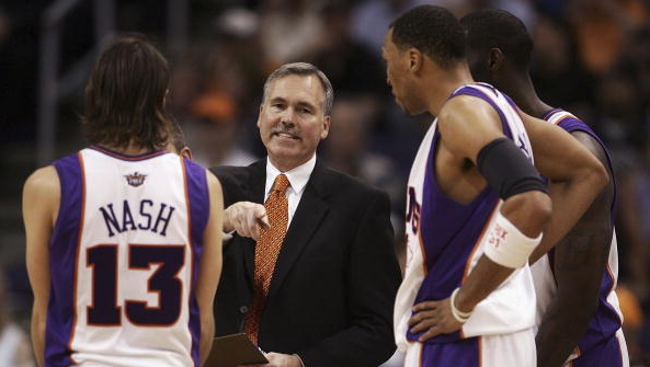
It’s hard to believe Steve Nash has been out of the league for almost three years now, given what a central and imposing figure he was during his playing career. That career will get its due Friday night when the two-time MVP joins a stacked class of inductees — including Jason Kidd, Ray Allen and Grant Hill — at the Hall of Fame enshrinement ceremony in Springfield.
It’s a great opportunity to look back on the impact he had on the league during his stellar tenure with the Phoenix Suns, and there’s been no shortage of pieces this week attempting to properly gauge the significance of his contributions to basketball. Much of that stems directly from former coach Mike D’Antoni’s recent comments that he regrets that he not encouraging Nash to shoot more.
It’s become more and more en vogue to look back at the “Seven Seconds or Less” Suns with perfect hindsight and see the evolutionary bridge to modern basketball, with Nash serving as the link between the old-school, pass-first point guard and the more modern way to approach the position, one that gives sharpshooting point guards the green light to fire away from three. Under D’Antoni’s stewardship, those Suns squads of the mid-2000s were the outliers of the league, hoisting up more three-pointers at their peak than anyone in the NBA at the time and playing at a breakneck pace better aligned with what you see today.
Still, Nash wasn’t quite an innovator at his position. The point guard revolution — which featured bigger, more athletic, offensive-minded talents like Derrick Rose, Russell Westbrook, and Steph Curry — was still in its infancy during Nash’s prime, while he skewed heavily toward the past in his mentality to set his teammates up first.
Knowing what we know now, the frustration is that he clearly had all the tools to be something different. By even today’s lofty standards, Nash is one of the greatest shooters of all time. He shot 42.8 percent from downtown for his career, but that comes with the caveat that he only attempted a little over three three-pointers a night, with 4.7 per game being his single-season peak.
It’s tempting, of course, to wonder what might’ve been if he were more aggressive as a scorer, perhaps even taking upwards of 10 threes per game like his contemporaries. Indeed, his career may have looked very different, and this is a perfectly valid thought experiment.

But looking at his career through that lens diminishes precisely what made Nash so special as a player: his uncanny ability to make everyone around him better, an innate talent that landed him at third all-time in assists in NBA history. Granted, you could argue that he was selfless to a fault. His other former coach, Don Nelson, did exactly that this week, citing his reluctance as a scorer as the primary reason he had the Mavericks ship Nash off to Phoenix.
It bears mentioning that “Nellie ball” was still a pretty transgressive concept at the time, and it’s not as if fast-paced, jump-shooting teams were proving everyone wrong and winning championships. The conventional wisdom said that point guards should set their teammates up first, and Nash himself bore that out.
If you are a fan of Nash, the frustration comes from wanting his career to mean more than it does now that we’ve had some time to process it, particularly in the disorienting light of the three-point revolution. It’s what’s fueling all these what-ifs. Yes, there’s some second-guessing to be had, and a yearning to imagine Nash unleashed as a 30-point per game scorer reigning hellfire on his opponents from long-range. It’s fine to imagine that, however wistfully.
But don’t let that cloud his actual accomplishments. Despite Shaq’s sour grapes, Nash is a two-time league MVP, in large part because we knew he was great and important, but weren’t sure exactly how to quantify it. That’s a pretty good way to sum up his career. So when he goes into the Hall of Fame tonight, let’s appreciate what is and not get too sidetracked with what could have been.






